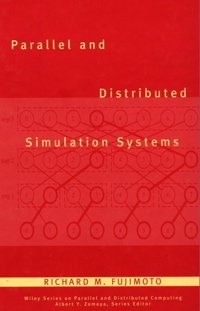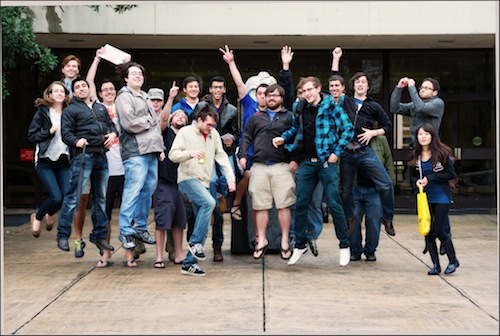Overview
This course is about the field of simulation & modeling, we will cover both simulation execution and simulation modeling. In simulation execution we will focus on discrete event simulation - both time and event driven. In modeling we will focus on financial modeling.
The simulation portion of the course will be on classic simulation execution in particular (p)arallel (a)nd (d)istributed (s)imulation (pads). We will cover the foundational algorithms and techniques to speed up simulation that have been developed over the last 30 years up to the current state of the art. Topics will range from synchronization algorithms, data distribution techniques, parallel and distributed applications running on top of simulation executives to high-performance analytic simulation and distributed virtual environments.
In (financial) modeling we will look at a discrete event modeling framework (ABIDES - a python framework)- and work on hands-on project. We will primarily use the python programming language to implement the majority of our project, including python's pandas library, and the simulation framework SimPY and ABIDES (these are written in python).
Laptops are required, also you will need to be able to install the python framework - in particular the anaconda distribution.
The course includes 2 movies that we will watch together in class.
Logistics:
| Date /Time: | Tu/Th: | 11:10-12:25 | Room 238 - 1041 R.C Wilson Pharmacy [14 seats] |
| We | 11:30-12:20 | Everyone is on Zoom | |
| Instructor | Th | TBD | Office Hours TBD |
| TA | none. | ||
| Communication | piazza | ||
Course Material & Textbook
You will need at least two books, these are available to purchase both in electronic and the hard copy formats. IN addition to the below books we will also reference Wikipedia and Grinold & Kahn's Active Portfolio Book, and various Internet resources. We will use simPY python discrete event simulation system, and the ABIDES discrete event framework for financial modeling.
 |
|
|
 |
|
|
 |
|
|
Grading Policy and Evaluation:
You are evaluated via participation & quizzes, projects, paper summaries, presentations and implementation of software projects. The distribution is below, but is subject to change.
NOTE: Syllabus & policies are solidified after 3rd week of class - but there still may be minor changes.
| Projects (P5-P6) | 55% |
| Final Project: (take home project, live feed presentation during final exam period & code, report) | 15% |
Participation : on-line (attendance with camera on) |
5% |
| HW/on-line discussions/on-line quizzes |
10% |
| Weekly Summaries (starting around week 3) | 10% |
| Presentations/Demo (2 per student in a group) | 05% |
The general grading philosophy is the following (the context is "programs" and "projects" but it should generalize to summaries and to other required elements). See translation from percentage to letter grades finger grade in link further below.
A+ Extraordinary, goes beyond the minimum criteria both in depth and breath. Design is thorough and well thought out, code base and implementation is beautiful- modularized, complete, clear and concise. A well thought out debugging strategy is apparent. Well documented code. The evaluation plan is well executed and well thought out, goes beyond the simple cases and illustrates strong problem solving skills.
A Superior (somewhat less than an A+, almost perfect code, beautiful, concise, minimum criteria met, not as much depth and forethought as an A+ but it is superb), goes beyond meeting the minimum criteria demonstrates depth, can apply solution to a variation of similar problems.
B Good, minimum criteria well executed and well done, shows some depth and understanding, meets most test cases but does not demonstrate as much forethought as an A;
C Fair, minimum criteria met, but could have been executed with more depth and forethought.
We will use the College Board's convention to convert from percent grades to letter grades grades:
(see here).
Late Policy
Assignments, and summaries (if applicable to this class) are due on the date and time specified in the assignment or the day of demonstration (email as a time stamp and hand-in hardcopy the next day). Late homework cannot be accepted (some exceptions with mitigating circumstances discussed with instructor *before* due date).
Homework and Projects Posting
Projects and homework will be posted on the web from the scheduling page (see link top menu bar), and will be accessible from anywhere on the Internet. Assignments may be posted before they are officially assigned; however, you should not assume that an assignment on the schedule page is in final form until the date it is assigned. In other words, assignments are subject to change before the date that they are officially assigned. There may be additional required elements.
The software programming projects are of-course an important component of this course. You'll be making programs of the languages specified in class or on schedule page (e.g., Python, Java, Scala, or C, C++). The programming tools you'll need (game engine, simulation engine, compiler, debugger, etc.) may be denoted on the project page and should be downloaded and installed on your laptop and /or workstation.
Currently the programming languages used in this class are: Python (you may chose to do your final project in a different language).
Technical Paper Summaries
You will read/skim at least one technical paper or essay every week. For each week each you will prepare a 1-page summary on one of the presented papers (you may chose any one of the two). This summary must be emailed to the grader account (or instructor if we don't have a grader), before midnight on the day the paper is due, typically a Wednesday. You also must turn in a hard copy of the paper the following day (Thursday). The hardcopy will be used for grading and the email will check when you turned in the summary. The summary needs to reflect that you made an effort to read and understand the paper. The summary should address the questions listed on the reading list. You should also include a brief critique of the current week's presentation (both presentations). What else should have been included?/excluded? Suggested improvements? You may skip up to 2 summaries without a penalty (see reading page link above for specific questions that you need to address).Presentations
Currently we will present on minitopics - typically 5-10 minutes. These can be on projects or exercises you worked on, or you can talk about a game that you enjoy playing, a game genra, or interesting features of an existing game.
Participation and Attendance
Class attendance is mandatory; we do take attendance frequently, and class participation is 5% of your grade. Excused absences count when taking attendance - we do take it frequently so missing one or two classes should have minor effect on your grade.
Instructor Enforced Withdrawals
Missing 8 days or more of classes (inclusive of excused absences) is considered excessive absentia and may result in an instructor enforced withdrawal.
Missing 2 scheduled exams (inclusive of excused absences) may result in instructor enforced withdrawal.
Other Class Policies
If you miss class it is your responsibility to find out what you missed if you don't attend class. Please do not email instructor and ask what you have missed - you may ask however after class.
You are required to subscribe to the class email list or forum (Piazza)- and be aware that sometimes homework is assigned or templates are distributed via this forum - or there are some hints posted in the forum - you probably do not want to miss that.
The purpose of the assignments and projects is familiarization of concepts and details of programming.. The assignments & projects are expected to be individual work unless other specified. However, you are encouraged to ask questions of one another, and to respond to other student's questions on the email list.
Direct exchange of code is prohibited, as is line-by-line assistance from anyone or thing (this includes Internet copying). This is checked for every assignments. If you do get help from other sources than book, slides, or TA you must acknowledge the source in the material that you turn in -but note still no copying is allowed.
Unless otherwise specified, exams are closed-book and no additional materials may be used. Missing an exam: absence due to serious illness will be an acceptable reason for missing an exam. Doctor's diagnostic note is required (these absences may be confirmed with your doctor). The final grade will be scaled accordingly.
Missing multiple exams, including excused exams may result in 0 on each exam, and an instructor enforced withdrawal.
You must subscribe to the class email list, see details HW1 listed on the schedule page. Assigned homework (if any) must be typed, you must also email a copy to the class email account.
Class Photo: A Previous Simulation Class
